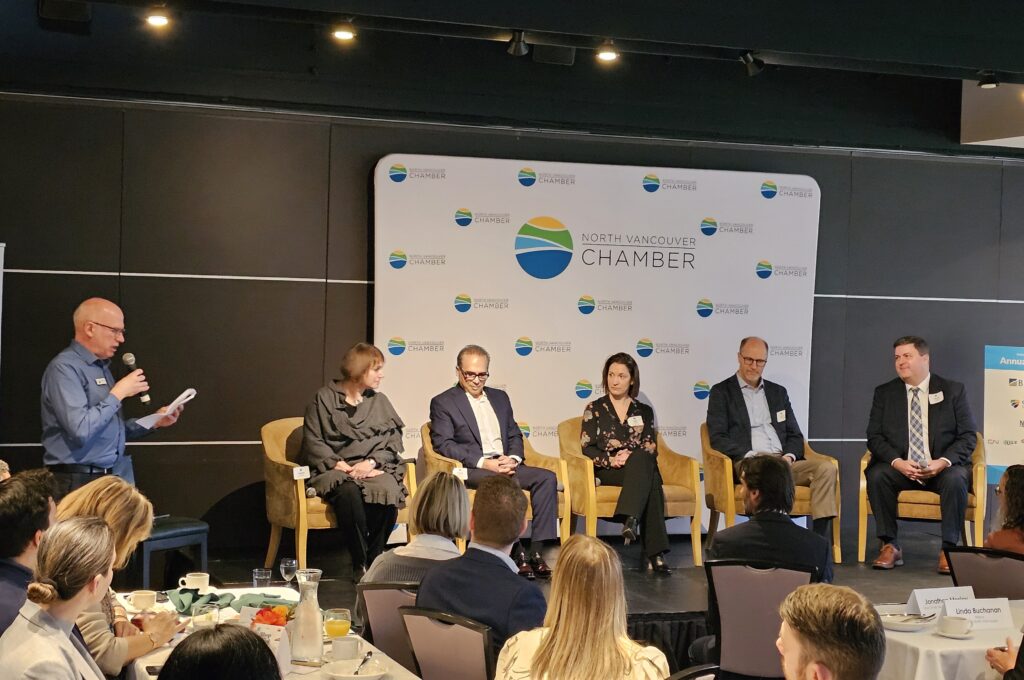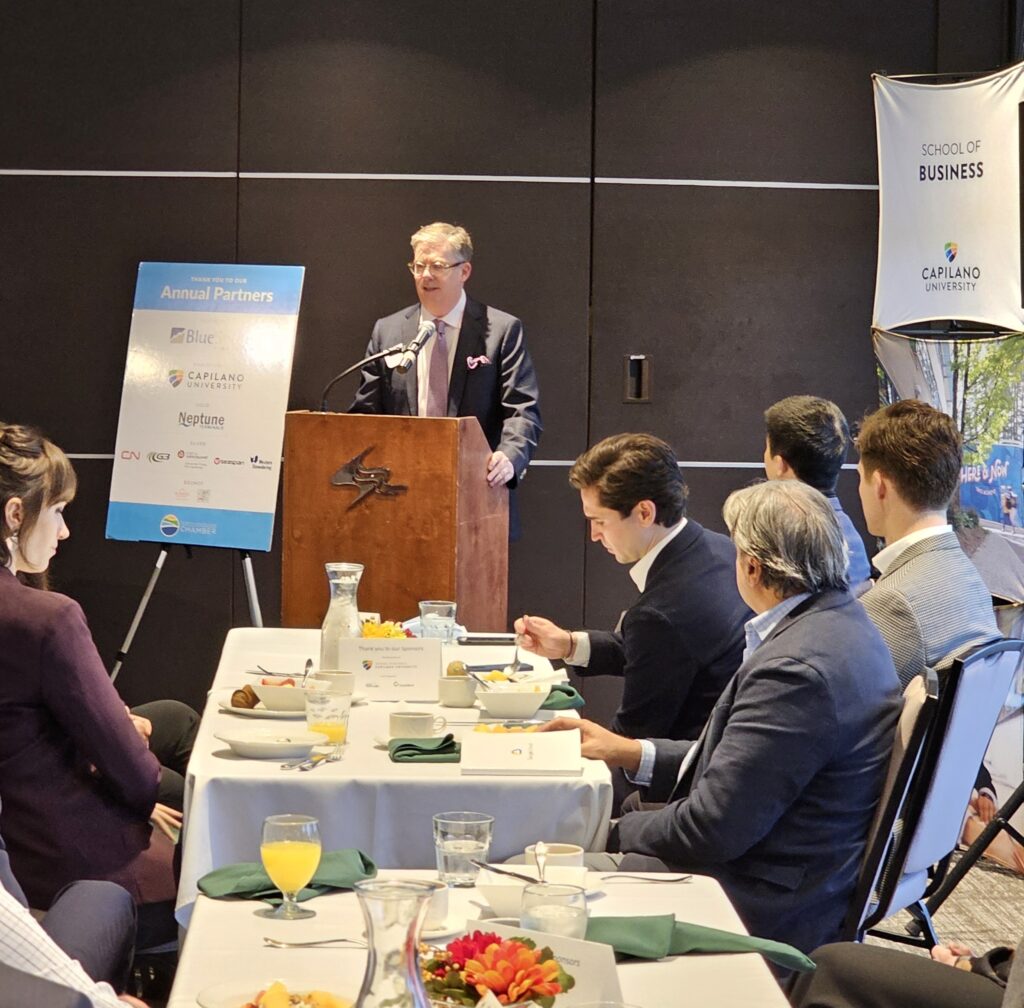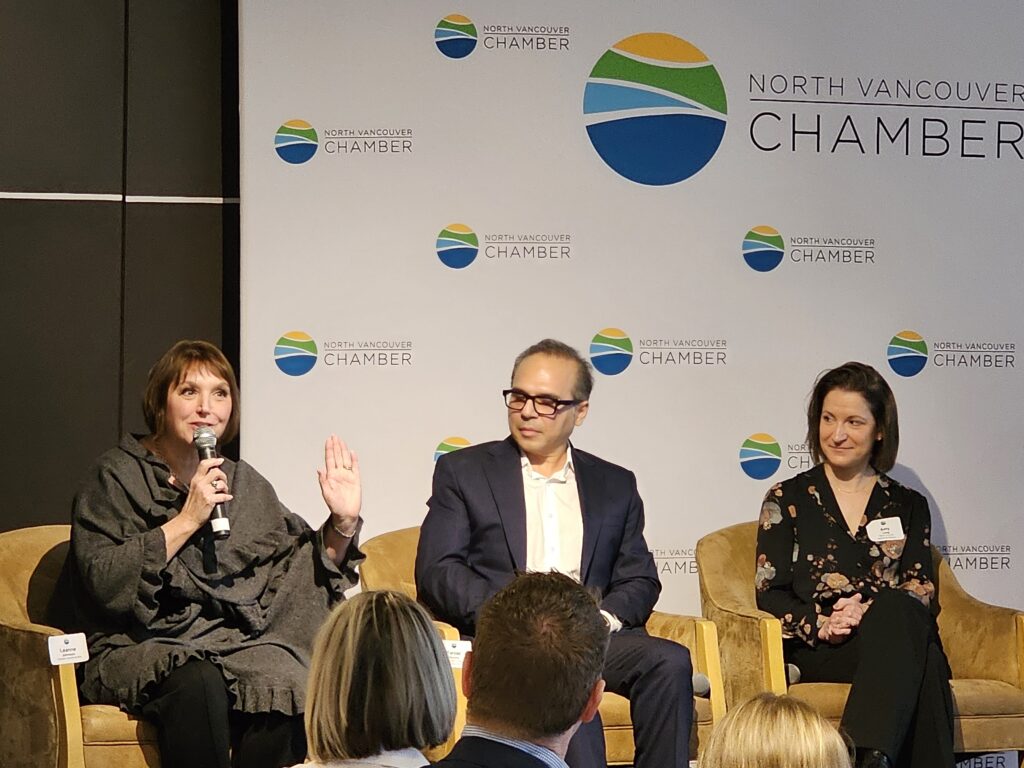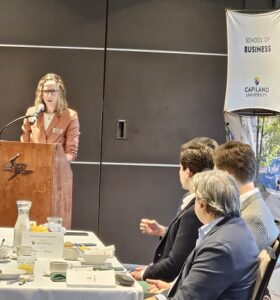
North Vancouver Chamber CEO Patrick Stafford-Smith poses questions to The State of Business 2024 panelists.
Valuable conversations were sparked while personal business perspectives and industry insights were shared at North Vancouver Chamber’s sold-out The State of Business 2024 event at Seymour Golf & Country Club on January 25.
BlueShore Financial President & CEO Ian Thomas set the tone for the local business forum with his insightful keynote address and economic forecast for the year ahead.
Three themes, said Thomas, will dominate business conversation on the North Shore in 2024: inflation, housing, and the economy.
Consumer spending will continue to slow in the near term, as the cost of living, including housing prices, remains high.

BlueShore Financial President & CEO Ian Thomas delivers his keynote address.
The good news, Thomas told event attendees, is that interest rates are expected to decrease later this year.
“Overall, there is a consensus that we are going to start seeing that relief coming at some point in the year, which will bring a renewed sense of confidence for both businesses and consumers,” said Thomas.
The key to success in this economy, advised Thomas, is staying informed and on top of trends and events, including geopolitical issues and upcoming Canadian and U.S. elections.
Business leaders should drive forward with innovation and, when faced with short-term obstacles, not lose sight of long-term objectives.
“And I think the future is bright, especially for us here in our local community,” said Thomas.
North Vancouver Chamber CEO Patrick Stafford-Smith moderated the State of Business panel discussion, which featured: Colin Armstrong, President & CEO, HTEC; James Clarke, Chief Financial Officer, Seaspan; Leanne Johnson, President, GardenWorks; Amy Lang, President, North Shore Studios & Mammoth Studios; and Farzad Mazarei, CEO, Cascadia Green Development.
Many North Vancouver businesses continue to be impacted by region-specific challenges including housing and transportation.
“You can’t separate the two on the North Shore, unfortunately,” said Clarke.
Seaspan, with a 3,000-strong workforce, is one of North Vancouver’s biggest employers and offers a variety of well-paying jobs.
Yet many of Seaspan’s employees live elsewhere, including as far east as the Fraser Valley, due to a lack of local affordable housing.
By introducing employee shuttles, Seaspan has shown initiative to alleviate some traffic congestion.
“We’re supportive of all proposals, quite frankly, to improve the rapid transit infrastructure, to invest in that, and to create more flexibility for our workforce,” said Clarke.
Mazarei revealed a similar challenge with housing options for his employees, saying that 70 per cent of them commute to the North Shore and from as far away as Abbotsford.
“In 2023, we came to a collective realization that the housing inventory shortage hit a crisis level,” said Mazarei.
At GardenWorks, Johnson is getting creative to attract staff, pledging to make their working environment “as awesome as possible.”
“You’re trying to attract talented, bright, motivated, enthusiastic people, and they don’t want to travel over the bridge; they want to live here, and life is expensive,” said Johnson.
Rising operating costs have become a constant concern for local businesses these days.
“All kinds of operating costs, whether they’re utilities, security, garbage removal, anything – they’re all going up,” said Johnson. “You know, that’s really tough on our business.

Panelists Leanne Johnson, President, GardenWorks; Farzad Mazarei, CEO, Cascadia Green Development; and Amy Lang, President, North Shore Studios & Mammoth Studios.
What has helped Johnson with some business expenses is being in tune with available supports. “Are there grants, funding, or sponsorships for your type of business?” she said.
Local businesses are taking the lead on climate change adaptation. Environmental sustainability is at the forefront of operations at North Vancouver-founded HTEC – the driving force behind Canada’s hydrogen station network.
HTEC has been given approval to create, in the Maplewood area, the province’s largest hydrogen liquefaction plant, capable of powering 30,000 vehicles.
“We are a solutions provider to help people be more sustainable with their transportation,” explained Armstrong.
Cascadia Green Development, as its name suggests, is a sustainable land development and construction firm headquartered in Lower Lonsdale, widely recognized for its environmental consciousness and innovation.
The local film and TV industry provides not only entertainment but also employment and a valuable economic spinoff in North Vancouver, the State of Business audience learned from Lang.
“It’s construction, it’s tourism, it’s catering, it’s arts, it’s hair and make-up, it’s costuming, and they really have a large impact on small businesses,” said Lang. “They go to the flower shop at Park & Tilford and spend hundreds of thousands of dollars on set decoration.”
Regarding short-term rental legislation in B.C., there is a consensus from the State of Business panel: add flexibility to the rules.
“That does seem like a good idea, differentiating between a business and a vacation for the Airbnb, said Armstrong. “If you bring an employee into a community, it’s sort of another stream of taxes, and it helps out.”
HTEC receives a lot of interest from skilled workers in Alberta who can’t make a full-time commitment to Vancouver in the absence of affordable housing. In the meantime, Armstrong is exploring the idea of a hybrid B.C.-Alberta work arrangement, which requires short-term housing.
As Lang explained, out-of-town talent working on a show for six weeks would prefer the comfort of living in a rental suite, like a member of the community.
How will artificial intelligence impact local businesses?
“I actually don’t think it will take professionals away. What I think it will do is enhance the capabilities,” said Clarke, adding that Seaspan is investing in tools and technology, including robotic welders, that allows them to remain competitive with shipyards overseas.
An audience member asked: Are there plans for small- and medium-sized office space in North Vancouver?
“What we’ve been witnessing is a strong demand for office space here on the North Shore,” answered Mazarei, whose company is proposing a project with office space.
The State of Business discussion ended with optimism, as each panelist revealed what they are looking forward to in 2024.
“I’m really looking forward to the continuation of events like this, where we can really learn from one another, and hear one another,” said Johnson.
Laura Kinderman, Dean of Capilano University’s Faculty of Business and Professional Studies, (Presenting Sponsor) said building connections and sharing common experiences is important.
“We have a keen interest to connect with you, to share and talk about future possibilities, to work in collaboration with you – our amazing business community. We are developing your employees and leaders of the future,” said Kinderman.

Laura Kinderman, Dean of Capilano University’s Faculty of Business and Professional Studies, speaks to attendees.
Thank you to The State of Business 2024 Presenting Sponsor Capilano University School of Business and Event Supporters North Vancouver District and QuadReal Property Group.




